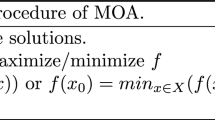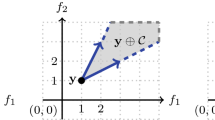Abstract
We study the behavior of a population-based EA and the Max–Min Ant System (MMAS) on a family of deterministically-changing fitness functions, where, in order to find the global optimum, the algorithms have to find specific local optima within each of a series of phases. In particular, we prove that a (2+1) EA with genotype diversity is able to find the global optimum of the Maze function, previously considered by Kötzing and Molter [9], in polynomial time. This is then generalized to a hierarchy result stating that for every \(\mu \), a (\(\mu \)+1) EA with genotype diversity is able to track a Maze function extended over a finite alphabet of \(\mu \) symbols, whereas population size \(\mu -1\) is not sufficient. Furthermore, we show that MMAS does not require additional modifications to track the optimum of the finite-alphabet Maze functions, and, using a novel drift statement to simplify the analysis, reduce the required phase length of the Maze function.

Similar content being viewed by others
References
Alba, E., Nakib, A., Siarry, P.: Metaheuristics for Dynamic Optimization. Studies in Computational Intelligence. Springer, Berlin (2013)
Auger, A., Doerr, B. (eds.): Theory of Randomized Search Heuristics: Foundations and Recent Developments. World Scientific Publishing, Singapore (2011)
Doerr, B., Pohl, S.: Run-time analysis of the (1+1) evolutionary algorithm optimizing linear functions over a finite alphabet. In: Proceedings of the Genetic and Evolutionary Computation Conference (GECCO ’12), pp. 1317–1324. ACM Press, New York (2012)
Droste, S.: Analysis of the (1+1) EA for a dynamically bitwise changing OneMax. In: Proceedings of the Genetic and Evolutionary Computation Conference (GECCO ’03), pp. 909–921. Springer, Berlin (2003)
Gunia, C.: On the analysis of the approximation capability of simple evolutionary algorithms for scheduling problems. In: Proceedings of the Genetic and Evolutionary Computation Conference (GECCO ’05), pp. 571–578. ACM Press, New York (2005)
Hajek, B.: Hitting and occupation time bounds implied by drift analysis with applications. Adv. Appl. Probab. 14, 502–525 (1982)
Jansen, T., Schellbach, U.: Theoretical analysis of a mutation-based evolutionary algorithm for a tracking problem in the lattice. In: Proceedings of the Genetic and Evolutionary Computation Conference (GECCO ’05), pp. 841–848. ACM Press, New York (2005)
Jansen, T., Zarges, C.: Evolutionary algorithms and artificial immune systems on a bi-stable dynamic optimisation problem. In: Proceedings of the Genetic and Evolutionary Computation Conference (GECCO ’14), pp. 975–982. ACM Press, New York (2014)
Kötzing, T., Molter, H.: ACO beats EA on a dynamic pseudo-boolean function. In: Parallel Problem Solving from Nature-PPSN XII, pp. 113–122. Springer, Berlin (2012)
Lehre, P.K., Witt, C.: General drift analysis with tail bounds (2013). arXiv:1307.2559
Lissovoi, A., Witt, C.: MMAS versus population-based EA on a family of dynamic fitness functions. In: Proceedings of the Genetic and Evolutionary Computation Conference (GECCO ’14), pp. 1399–1406. ACM Press, New York (2014)
Neumann, F., Witt, C.: Bioinspired Computation in Combinatorial Optimization: Algorithms and their Computational Complexity. Natural Computing Series. Springer, Berlin (2010)
Nguyen, T.T., Yang, S., Branke, J.: Evolutionary dynamic optimization: a survey of the state of the art. Swarm Evolut. Comput. 6, 1–24 (2012)
Oliveto, P.S., Zarges, C.: Analysis of diversity mechanisms for optimisation in dynamic environments with low frequencies of change. In: Proceedings of the Genetic and Evolutionary Computation Conference (GECCO ’13), pp. 837–844. ACM Press, New York (2013)
Rohlfshagen, P., Lehre, P.K., Yao, X.: Dynamic evolutionary optimisation: An analysis of frequency and magnitude of change. In: Proceedings of the Genetic and Evolutionary Computation Conference (GECCO ’09), pp. 1713–1720. ACM Press, New York (2009)
Storch, T.: On the choice of the parent population size. Evolut. Comput. 16(4), 557–578 (2008)
Stützle, T., Hoos, H.H.: Max–min ant system. Futur. Gener. Comput. Syst. 16(8), 889–914 (2000)
Sudholt, D.: Using markov-chain mixing time estimates for the analysis of ant colony optimization. In: Proceedings of the 11th Workshop on Foundations of Genetic Algorithms (FOGA ’11), pp. 139–150. ACM Press, New York (2011)
Sudholt, D., Thyssen, C.: Running time analysis of ant colony optimization for shortest path problems. J. Discrete Algorithms 10, 165–180 (2012)
Witt, C.: Fitness levels with tail bounds for the analysis of randomized search heuristics. Inf. Process. Lett. 114(1), 38–41 (2014)
Author information
Authors and Affiliations
Corresponding author
Rights and permissions
About this article
Cite this article
Lissovoi, A., Witt, C. MMAS Versus Population-Based EA on a Family of Dynamic Fitness Functions. Algorithmica 75, 554–576 (2016). https://doi.org/10.1007/s00453-015-9975-z
Received:
Accepted:
Published:
Issue Date:
DOI: https://doi.org/10.1007/s00453-015-9975-z




